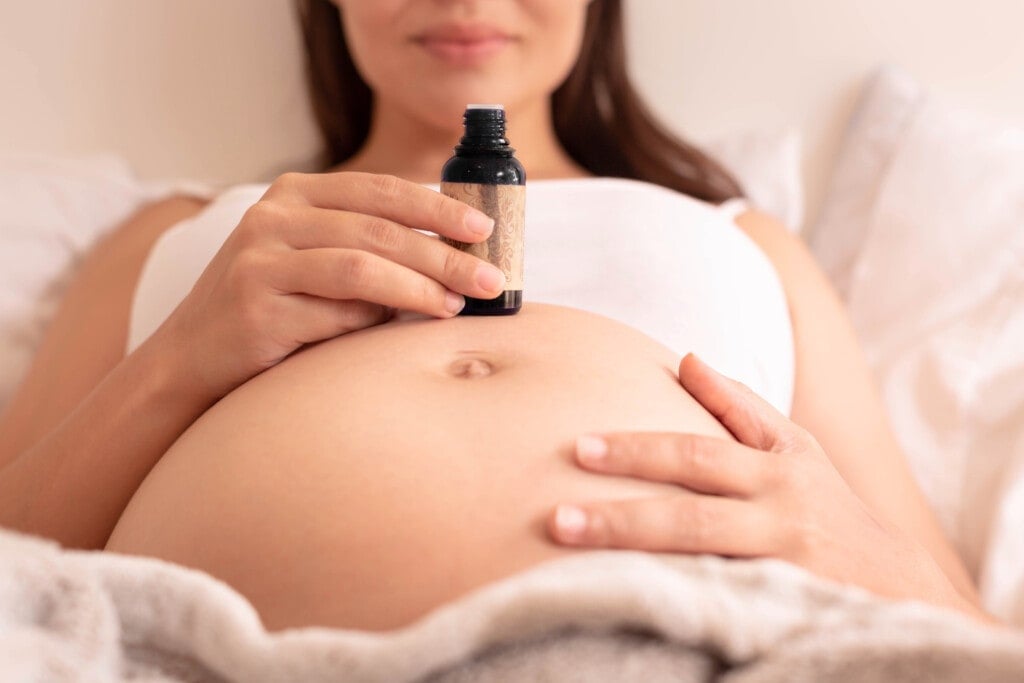Pregnancy is easy and has no pain, said no expecting mom ever. But there’s no denying that growing a tiny human inside of you comes with cramps, pangs, and being uncomfortable— we’re looking at you, heartburn, backaches, nausea, and constipation.
For pregnant mothers, easing these symptoms is key. As a result, some turn to essential oils as a natural relief method to help them get through those nine months. And to help you decide if essential oils suit you, we’ve broken down everything you need to know, from which ones are safe to use and which you should completely avoid to knowing how to use them safely and learning what not to do with them.
What Are Essential Oils?
Essential oils are naturally scented plant extracts created from distillation or by pressing the aromatic parts of a plant, like its leaves, roots, and bark. Afterward, the removed compounds retain the plant’s original scent and flavor and can be concentrated in oil. And due to their pleasant odor, they’re often used in cleaning and beauty products, such as creams, lotions, and perfumes.1,2
Are Essential Oils Safe for Pregnancy?
As with all things during pregnancy, essential oils should be used in moderation and with precaution. But your safest use of essential oils is to smell the aromas by adding them to a diffuser or a thin, absorbent fabric like tissue, cotton ball, or gauze. You can also create a room spray by diluting the oil in water and spritzing it in a general area to enjoy the fragrance.2,3
While pregnancy-related aches and pains can be brutal, it’s vital to refrain from over-inhaling essential oils, ingesting them, placing droplets under your tongue, or applying them topically on your skin.
How Can Essential Oils Help During Pregnancy?
All essential oils have unique chemical compositions, each with its own scent and natural properties. Some can help reduce anxiety and calm nerves, while others can provide a good night’s rest — music to a carrying mother’s ears.3
Additional benefits of pregnancy-safe essential oils include:4
- Boosting your mood
- Helping you relax
- Combating morning sickness and nausea
- Soothing sore muscles and back pain
- Alleviating headaches
Essential Oils to Avoid During Pregnancy
Although essential oils can be an excellent tool to help relieve uncomfortable pregnancy symptoms, there are several that mamas should stay far away from. A study published in 2021 found that not all essential oils are safe — despite being made from a plant.5
The researchers discovered that some could significantly impact a pregnancy, from causing the body to abort the fetus and creating problems with a woman’s reproductive system to disrupting reproductive hormones and the development of a fetus. Some of the oils included in the report were:5
- Aniseed
- Basil
- Cinnamon bark
- Hyssop
- Lemon basil, lemon leaf, and lemongrass
- Myrrh
- Mugwort
- Nutmeg
- Oregano
- Parsley seed or leaf
- Pennyroyal
- Rue
- Tansy
- Wintergreen
- Wormwood
Physicians at Moreland OB-GYN in Wisconsin also recommend moms skip these additional essential oils until their baby has made their debut into the world:6
- Birch
- Camphor
- Clary sage
- Oakmoss
- Peppermint
- Rosemary
- Sage
- Tarragon
- Thuja
- Thyme
Best Essential Oils for Pregnancy
Despite the lengthy list of essential oils you should not use, many are safe for expectant mothers. We’ve researched for you and compiled them into a go-to list, so you can focus on reaping the benefits.3,7
- Cardamom, ginger, petitgrain, and sweet orange can help you say goodbye to morning sickness and nausea.
- Frankincense, German chamomile, lavender, neroli, rose, rosewood, and Roman chamomile are great additions to your essential oil arsenal to promote calmness, relaxation, and — what every parent dreams of — sleep.
- Geranium, patchouli, sandalwood, and wild orange are happy oils that can help lift your spirits and bring up your mood.
- Sandalwood, petitgrain, and Roman chamomile can ease bouts of heartburn.
- Benzoin, lavender, and juniper can appease abdominal discomfort.
- Cypress, neroli, and sweet marjoram can reduce the number of trips you take to the restroom.
How to Safely Use Essential Oils During Pregnancy
Ultimately, it’s best to consult your physician before diving into essential oils. If you’ve been given the okay, there are a few things to consider:
- Test a small amount in a diffuser or on gauze and gently breathe in the scent. Be cautious about getting the oil on your face or skin.
- As mentioned, avoid applying essential oils directly to your skin. Peppermint, lavender, tea tree, and ylang-ylang have been shown to contain specific allergens that can cause skin irritation, allergic reactions, or even a type of contact dermatitis.8
- Never consume an essential oil. There is insufficient supporting research to back up safety claims or its prenatal effects. One study reported the dangers of swallowing essential oils, in which a patient who swallowed a peppermint essential oil had a near-death experience.3,9
How to Find Quality Essential Oils
Before using essential oils, you must add high-quality, natural options to your shopping cart. Here are several tips for finding a true essential oil that won’t be a hazard to you and your developing baby:
- Beware of unnatural ingredients, like synthetic chemicals: Check the label of any essential oil you’re considering purchasing to ensure it’s a pure product. If you find the ingredients include synthetic additives, like vegetable oil, it is not a true essential oil; it dilutes the product and interferes with its natural healing properties.10
- Lower prices may mean lower quality: In the world of essential oils, it’s common for natural oils to be sold much higher than synthetic oils. So if you think you spotted a good deal, it may not be the real deal.11
- Be mindful of buzzwords: If the packaging of oil claims it’s “100% natural,” “natural,” or “pure,” keep in mind it does not necessarily mean it’s the highest quality product. Because essential oils are typically natural and pure, using these keywords on labels is unnecessary.2
- Watch out for “fragrance” labeling: Search for essential oils that are in their purest form and do not contain fragrance or perfume oils. Researchers at the University of Vienna warn of products that do not state if they’re “fragrance-free,” “contain no perfume,” or “scented-free.” 2
Some essential oils can be safe to use throughout your pregnancy and help reduce some of the troublesome symptoms associated with having a baby. However, some are not, and if you break out into a rash, accidentally ingest it, or experience adverse reactions, call your physician immediately to ensure you and your baby can be taken care of and kept out of harm’s way.
































